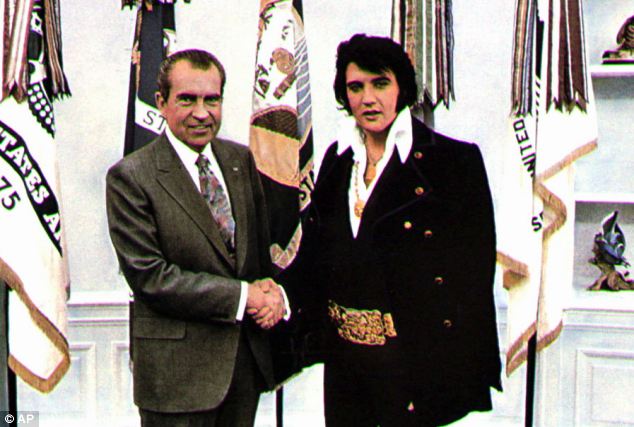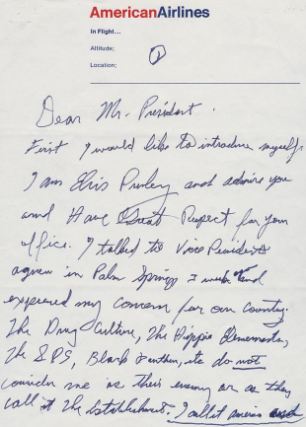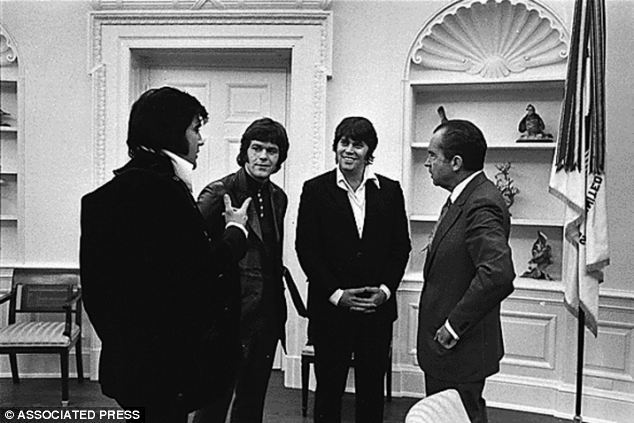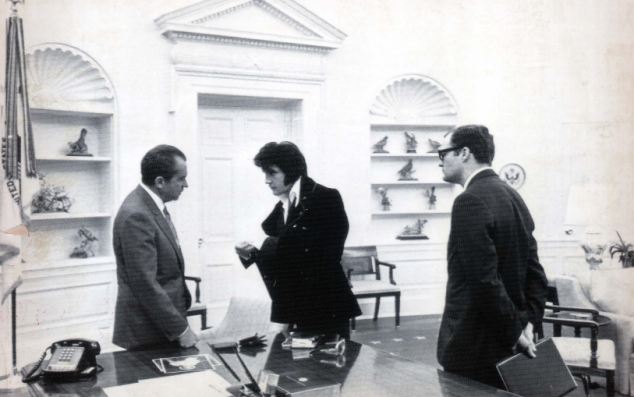Tom Leonard
Daily Mail
August 15, 2013
- In his letter Elvis Presley said he wanted to help Richard Nixon save the U.S
- Letter led to meeting of counter-culture icon and Right-wing bogeyman
- A new book has revisited the letter that brought the two together
The handwriting was barely legible, a spidery scrawl on American Airlines headed notepaper, written 30,000ft up by a man with a prescription drug-addled brain and an extraordinary request.
‘Dear Mr President,’ it began. ‘I would like to introduce myself. I am Elvis Presley and admire you and Have Great Respect for your office.’
With all the touching candour of a young fan writing to Jim’ll Fix It, the King of Rock ’n’ Roll said he wanted to help Richard Nixon save the U.S. from the hippies, the commies and The Beatles.

But he had a small request. Might he, perhaps, be made some sort of undercover federal agent? Perhaps with his very own ID badge?
It was the sort of missive — five pages long, full of underlinings, misplaced capital letters and eccentric political opinions — that one might have expected to have sailed straight in to a Washington waste paper bin.
But instead it led to one of the most bizarre encounters ever to take place in the White House, an unlikely meeting of counter-culture icon and Right-wing bogeyman that both sides understandably did their best to keep secret.
Now, Letters Of Note, a book on illuminating correspondence from the past to be published in October, has revisited the letter that brought Elvis the Pelvis and Tricky Dicky together.
Thanks to this letter, Presley was saddled for ever with a reputation as one of rock music’s great closet Right-wingers — although, as we will see, the truth may be rather different.
Given the outlandish contents of the letter, it shouldn’t be a huge surprise that the circumstances of how Presley came to write it in December 1970 were similarly weird.
Only a few days earlier at his family home in Memphis, Tennessee, Presley, then 35, had been confronted by his father, Vernon, and wife, Priscilla, over his recklessly lavish spending. That year, Elvis has given family and friends Christmas presents including ten Mercedes cars and 32 handguns.
A sulking Presley headed to the nearest airport and, after a series of random flights around the U.S., took off for Washington on a red-eye flight from Los Angeles.
His mission, close friends believed, was to track down a crucial piece that was missing from his treasured collection of law enforcement paraphernalia — an ID badge from the Washington-based Federal Bureau of Narcotics and Dangerous Drugs. Elvis had talked about it endlessly, and it had become an obsession.
 As luck would have it, a Californian senator, George Murphy, was travelling on the same flight, and when Presley disclosed his burning ambition to get the badge, the senator (surely stifling the urge to choke in shock on his airline cocktail peanuts) suggested the rock star write to the President offering his services in the war on illicit drugs. Elvis, he suggested, could appeal to young Americans the way a Washington senator never could.
As luck would have it, a Californian senator, George Murphy, was travelling on the same flight, and when Presley disclosed his burning ambition to get the badge, the senator (surely stifling the urge to choke in shock on his airline cocktail peanuts) suggested the rock star write to the President offering his services in the war on illicit drugs. Elvis, he suggested, could appeal to young Americans the way a Washington senator never could.
Presley — never the world’s neatest scribbler — got straight to work.
Despite already having a serious problem with the prescription drugs, such as barbiturates, which were later to help kill him, Elvis had been expressing public concern about drug abuse by the young.
He and the President were as one on this, as they were on their vision of America. He wrote: ‘The drug culture, the hippie elements, the SDS [the radical organisation Students for a Democratic Society], Black Panthers, etc. do not [underlined] consider me as their enemy or as they call it “the establishment”. I call it American and I love it.’
He was willing, he wrote, to do whatever was necessary to serve his country, although he did want a small something in return.
‘I can and will do more good if I were made a Federal Agent at Large and I will help out by doing it my way through my communications with people of all ages. First and foremost, I am an entertainer, but all I need is the Federal credentials.’
And in case the President dismissed him as just a swivel-hipped crooner, Presley insisted he had the necessary qualifications: ‘I have done an in-depth study of drug abuse and Communist brainwashing techniques and I am right in the middle of the whole thing, where I can and will do the most good.’
Could Presley — a man who only needed to look in his own bathroom cabinet to know about ‘drug abuse’ — really be serious?
He certainly seemed to be in earnest as he gave Nixon his room number at the Washington Hotel, where he said he was registered under the name Jon Burrows. ‘I will be here for as long as it takes to get the credentials of a Federal agent,’ he said hopefully.
He wrote he would love to talk the matter over with the President, but that he had one other request: that the whole matter be ‘kept very private’.
And in another reinforcement of his credentials, Presley noted he had just been nominated as one of ‘America’s Ten Most Outstanding Young Man (sic)’. Nixon, he added in a sycophantic postscript that must have appealed to the supremely conceited politician, was — he believed — one of the country’s Top 10 Outstanding Men, too.
When Presley touched down in Washington in the early hours of December 21, he took his letter straight round to the White House himself and handed it in at the gate.
Nixon’s advisers were soon discussing what they should do about it.
The President — strait-laced and ever one to smell a rat — was uneasy about meeting the singer.

But one of his top aides, Egil ‘Bud’ Krogh (who was later to be jailed as one of the Watergate conspirators), was a Presley fan who saw the huge PR potential of getting the superstar on board.
In a memo to Nixon he noted how ‘two of youth’s folk heroes, Jimi Hendrix and Janis Joplin’, had recently died of drug-related causes.
If young people were going to emulate rock stars, wouldn’t it be better if those stars championed ‘self-motivation and discipline’ as the key to success and ‘not artificial chemical euphoria’?
He suggested Presley might even be persuaded to record an anti-drugs album — called Get High On Life — at a state-run rehabilitation clinic. Another adviser agreed: the President needed all the help he could get in appealing to younger voters.

